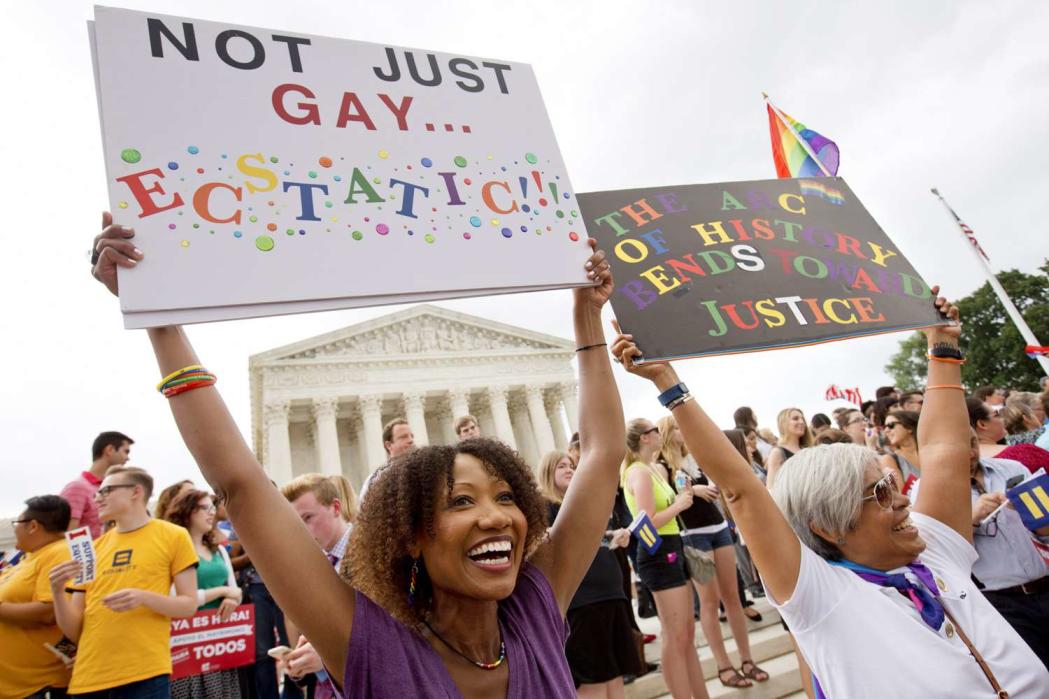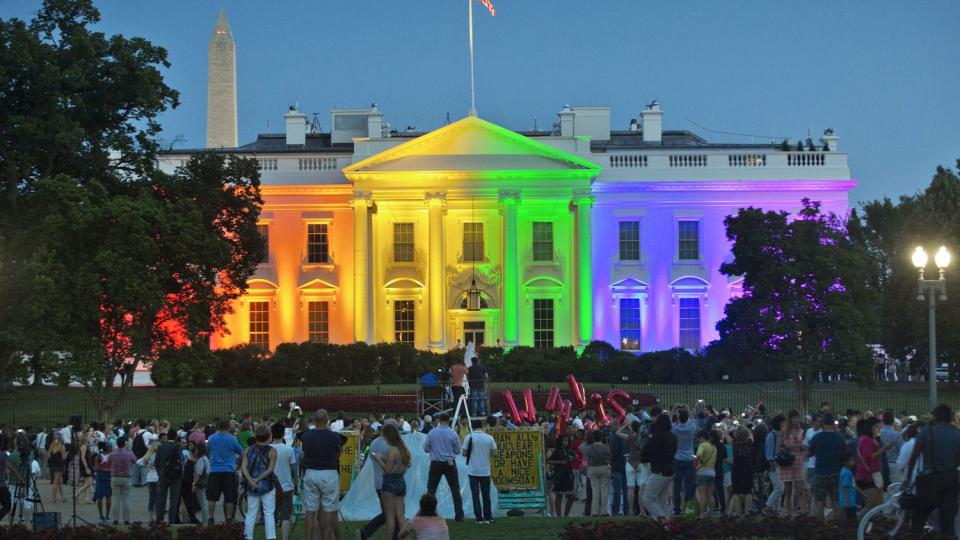The Respect for Marriage Act Can't Fully Replace 'Obergefell,' but It Can Help Prevent It from Being Overturned

AP Photo/Jacquelyn Martin Wives celebrate the legalization of same-sex marriage outside SCOTUS in 2015
The Respect for Marriage Act is Congress' attempt at protecting the right to same-sex marriage — and as national polls show record-high support for marriage equality, it has a chance of earning the 60 votes it needs in Senate to become law.
"We really think we have a shot to get this done," says David Stacy, government affairs director for the Human Rights Campaign, which helped lawmakers draft the RFMA. "I'm not hearing deep concerns with any of these provisions."
The RFMA, Stacy tells PEOPLE, would accomplish a few important goals. Most significantly, it would repeal the Defense of Marriage Act, a 1996 law that said the federal government will not recognize any same-sex marriages performed by states. (DOMA is currently unenforceable thanks to landmark Supreme Court decisions United States v. Windsor and Obergefell v. Hodges, though it still exists on paper, meaning it could be reinstated if those rulings were overturned by the current court's conservative stronghold.)
RELATED: What to Know About the 'Respect for Marriage Act' as D.C. Lawmakers Rush to Codify Same-Sex Marriage
To understand other portions of the RFMA, it's important to know what Congress can and cannot legally do. It cannot require state governments to issue marriage licenses to same-sex couples or grant them state-level marriage benefits — states have the ultimate authority there, second only to the Supreme Court. Congress can, however, exercise its power under the Constitution's full faith and credit clause by requiring every state to recognize marriage licenses, adoption orders and divorce decrees issued elsewhere.
The legislation also solidifies that the "place of celebration" in a marriage determines your eligibility for federal benefits. In other words, spouses are granted eligibility for federal benefits based on the place where they were married, not where they live. So if same-sex spouses live in a state that refuses to issue marriage licenses to same-sex couples, they would still be recognized as spouses by the federal government, giving them access to top-tier benefits involving spousal leave, social security and taxes.

AP Photo/Pablo Martinez Monsivais, File
Stacy explains that while the RFMA can't fully meet the protections of Obergefell — the 2015 Supreme Court case that legalized same-sex marriage nationwide — it would be a strong step toward ensuring longterm marriage equality, both because of its provisions and its statement to the world.
"We can demonstrate that both the House and the Senate have really significant and strong bipartisan support for this and we know the public is at 70% support. That in and of itself helps secure marriage equality," he says. "The more we can just make this the way things are in this country the less incentive the Supreme Court has to muck around, the fewer challenges will come to the court around these issues and the more the public's with us."
If the Supreme Court were still to move forward with reconsidering the Obergefell precedent — as Justice Clarence Thomas recently suggested in his concurring opinion on the ruling to overturn Roe v. Wade — the very presence of the RFMA would give the public more firepower to push back against states thinking of refusing to issue marriage licenses to same-sex couples.
"We think this is a positive step forward in continuing to show that this shouldn't be a partisan issue — and isn't a partisan issue," Stacy says, adding that despite its limitations, the RFMA is "the way we best protect marriage equality."

AP Photo/John Minchillo A couple shares a triumphant and emotional hug before their marriage ceremony on June 26, 2015
The Respect for Marriage Act passed in the House on July 19, earning the support of 47 Republican representatives, and will soon be brought to the Senate floor, where it will need the support of 10 Republicans in order to meet the 60-vote threshold and become law.
So far, a few Republican senators have suggested they will vote in favor of the RFMA, and a handful have voiced firm opposition. The majority of lawmakers on the GOP side are staying quiet, or offering vague statements that do little to shed light on where they stand.
The lack of clarity over senators' mindsets is unsettling, but Stacy — along with other lawmakers and organizations working to pass this important legislation — remains optimistic.
"We still feel good that we can get to 60," he says, noting that when Senate brought a vote on repealing Don't Ask Don't Tell in 2010, reaching the 60-vote minimum was also uncertain. It ended up passing with 65 yea votes. Again in 2013 as the Senate brought the Employment Non-Discrimination Act to a vote, passage was not guaranteed, and that one earned 64 yea votes.
In just a week, the HRC got more than 170 corporations and counting to join them in urging Republican senators to vote in line with Americans' values, not the tradition of their party. And in a telling move, Senate Minority Leader Mitch McConnell has stayed neutral on the bill thus far, seemingly forgoing his power to lobby for Republicans to oppose it and giving GOP senators more freedom to vote their conscience.
Never miss a story — sign up for PEOPLE's free daily newsletter to stay up-to-date on the best of what PEOPLE has to offer.
While nobody knows exactly when Senate Majority Leader Chuck Schumer will bring the RFMA to the Senate floor, it could be as early as next week. Senate breaks for a month-long recess on Aug. 8, and it will be up to Senate Democrats to strategize whether it's best to push a vote now or wait a little bit longer.
"We feel at HRC that we're close enough now that we're ready at any time," Stacy says, "but obviously Sen. Schumer has to make his own determinations and figure out the floor schedule."
Regardless of whether the bill becomes law, widespread support for Americans to marry the person they love — regardless of sex, gender identity and sexual orientation — is not going anywhere.
"The support for marriage equality is so consistent across poll after poll after poll," Stacy notes. "The numbers are ticking up and they're sticking."

